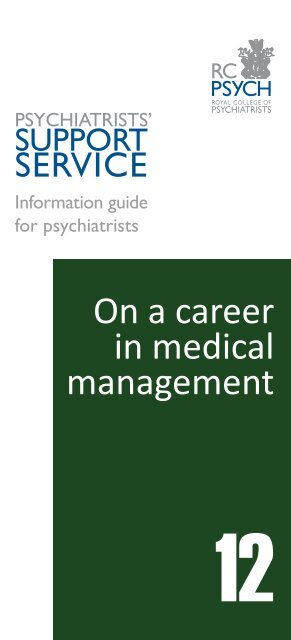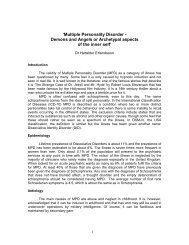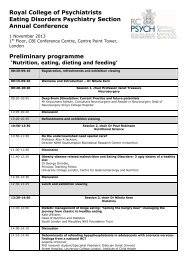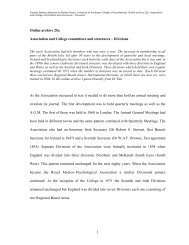On a career in medical management - Royal College of Psychiatrists
On a career in medical management - Royal College of Psychiatrists
On a career in medical management - Royal College of Psychiatrists
Create successful ePaper yourself
Turn your PDF publications into a flip-book with our unique Google optimized e-Paper software.
<strong>Psychiatrists</strong>’<br />
Support<br />
Service<br />
Information guide<br />
for psychiatrists<br />
<strong>On</strong> a <strong>career</strong><br />
<strong>in</strong> <strong>medical</strong><br />
<strong>management</strong><br />
12
This <strong>in</strong>formation guide is <strong>in</strong>tended for a consultant psychiatrist consider<strong>in</strong>g tak<strong>in</strong>g<br />
up a <strong>management</strong> role. The <strong>in</strong>formation can be used as a guide only and is not a<br />
substitute for pr<strong>of</strong>essional advice. If you need further advice and support, please<br />
contact the <strong>Psychiatrists</strong>’ Support Service or one <strong>of</strong> the organisations listed at<br />
the end <strong>of</strong> this <strong>in</strong>formation guide.<br />
Doctors can and should be <strong>in</strong>volved <strong>in</strong> the <strong>management</strong><br />
<strong>of</strong> the NHS at all levels, for they are the most appropriate<br />
group for the task.<br />
Anthony E. Young<br />
From its <strong>in</strong>ception, the National Health Service has <strong>in</strong>volved<br />
doctors <strong>in</strong> leadership and <strong>management</strong>; pr<strong>of</strong>essional managers<br />
have always needed the cl<strong>in</strong>ical help and expertise <strong>of</strong><br />
doctors. The skills <strong>of</strong> a psychiatrist are pert<strong>in</strong>ent to this role:<br />
our cl<strong>in</strong>ical skills are needed to understand the needs <strong>of</strong> the<br />
population and we are comfortable deal<strong>in</strong>g with systems and<br />
groups.<br />
Why do it?<br />
There are many reasons why psychiatrists choose to become<br />
<strong>in</strong>volved with <strong>management</strong>:<br />
some naturally enjoy leadership roles and political<br />
environments and seek out these roles and responsibilities<br />
some become dissatisfied with managers not tak<strong>in</strong>g <strong>in</strong>to<br />
account doctors’ views <strong>in</strong> mental health services, but<br />
<strong>in</strong>stead <strong>of</strong> shout<strong>in</strong>g from the sidel<strong>in</strong>es they have chosen to<br />
try to improve this situation by their own <strong>in</strong>volvement<br />
although most psychiatrists concentrate on <strong>in</strong>dividual<br />
patients, centr<strong>in</strong>g their work on the doctor–patient<br />
relationship, others see that the best way <strong>of</strong> improv<strong>in</strong>g<br />
the mental health <strong>of</strong> patients is by look<strong>in</strong>g at the whole<br />
population<br />
some psychiatrists have chosen to take another <strong>career</strong> path<br />
as they have become bored, frustrated or tired <strong>of</strong> cl<strong>in</strong>ical<br />
work<br />
others have a specific reason, for example personal development,<br />
champion<strong>in</strong>g their own services, f<strong>in</strong>ancial reward.<br />
What is <strong>medical</strong> <strong>management</strong>?<br />
All psychiatrists are <strong>in</strong>volved <strong>in</strong> <strong>medical</strong> <strong>management</strong> to some<br />
extent. For example, the role <strong>of</strong> a cl<strong>in</strong>ical leader with<strong>in</strong> a<br />
multidiscipl<strong>in</strong>ary team uses <strong>management</strong> skills for the whole<br />
population served by that team. However, the more formal<br />
posts are understood slightly differently with<strong>in</strong> each trust:
cl<strong>in</strong>ical lead may advise managers about the needs<br />
with<strong>in</strong> a service, but normally does not have operational<br />
<strong>management</strong> responsibilities<br />
cl<strong>in</strong>ical director is normally responsible for part <strong>of</strong> a<br />
mental health service and <strong>of</strong>ten has the budget for that<br />
service; they are not always <strong>medical</strong>ly tra<strong>in</strong>ed and normally<br />
work <strong>in</strong> partnership with a pr<strong>of</strong>essional manager<br />
associate <strong>medical</strong> director is a deputy for the <strong>medical</strong><br />
director and is normally primarily <strong>in</strong>volved <strong>in</strong> the pr<strong>of</strong>essional<br />
<strong>management</strong> <strong>of</strong> doctors, although some have operational<br />
responsibilities<br />
executive <strong>medical</strong> director sits on the trust board and<br />
provides pr<strong>of</strong>essional <strong>medical</strong> advice to the board and<br />
its <strong>of</strong>ficers, provides <strong>medical</strong> <strong>in</strong>put to the development<br />
<strong>of</strong> strategy and communicates the trust’s perspective to<br />
cl<strong>in</strong>icians; they support the work <strong>of</strong> cl<strong>in</strong>ical directors, are<br />
<strong>of</strong>ten <strong>in</strong>volved <strong>in</strong> cl<strong>in</strong>ical governance and are a pr<strong>of</strong>essional<br />
lead for the doctors with<strong>in</strong> the trust; they have a corporate<br />
role, most obviously <strong>in</strong> foundation trusts.<br />
Relationships with colleagues<br />
Although a <strong>management</strong> role can be very reward<strong>in</strong>g for the<br />
doctor personally, tensions can develop with other consultant<br />
colleagues. Consultants treasure their autonomy, so hav<strong>in</strong>g<br />
a <strong>management</strong> arrangement with a <strong>medical</strong> director can<br />
cause difficulties.<br />
Medical managers have the difficult task <strong>of</strong> balanc<strong>in</strong>g<br />
responsibilities to patients, the pr<strong>of</strong>ession and the<br />
organisation with<strong>in</strong> which they are senior managers. This<br />
can be at its most challeng<strong>in</strong>g when hav<strong>in</strong>g to manage close<br />
<strong>medical</strong> colleagues when difficulties arise over performance<br />
or service change and development. However, these are also<br />
the times when good <strong>medical</strong> <strong>management</strong> is vital for the<br />
public and the pr<strong>of</strong>ession.<br />
Medical managers are <strong>of</strong>ten criticised for switch<strong>in</strong>g camps<br />
– always hav<strong>in</strong>g some cl<strong>in</strong>ical programmed activities will<br />
help.<br />
Many <strong>medical</strong> managers are valued and respected by their<br />
colleagues for their work.<br />
Practical steps if th<strong>in</strong>k<strong>in</strong>g about a <strong>career</strong><br />
<strong>in</strong> <strong>medical</strong> <strong>management</strong><br />
<br />
<br />
<br />
Talk to someone already <strong>in</strong> a <strong>medical</strong> <strong>management</strong> role.<br />
Get a mentor early on.<br />
Go slowly, start with small roles and build up so that you<br />
ga<strong>in</strong> confidence <strong>in</strong> yourself and from colleagues.
Ensure you have clear tra<strong>in</strong><strong>in</strong>g: the British Association<br />
<strong>of</strong> Medical Managers can help develop skills; generic<br />
negotiat<strong>in</strong>g skills tra<strong>in</strong><strong>in</strong>g can be particularly helpful.<br />
Ensure that any <strong>management</strong> role is clearly with<strong>in</strong> your job<br />
plan <strong>in</strong> a manner that readily allows a return to full cl<strong>in</strong>ical<br />
activity.<br />
Ensure that there is a job description that can be fulfilled<br />
with<strong>in</strong> the time allowed.<br />
Ensure you have practical support with<strong>in</strong> the trust (e.g.<br />
adm<strong>in</strong>istration, f<strong>in</strong>ance, human resources) and pr<strong>of</strong>essional<br />
support outside the trust (e.g. attend<strong>in</strong>g the regional<br />
<strong>medical</strong> managers’ meet<strong>in</strong>gs).<br />
Remember that you are a doctor and are answerable to<br />
the General Medical Council, which has clear expectations<br />
<strong>of</strong> the duties <strong>of</strong> <strong>medical</strong> managers, and a psychiatrist, who<br />
needs to meet the expectations <strong>of</strong> the <strong>Royal</strong> <strong>College</strong> <strong>of</strong><br />
<strong>Psychiatrists</strong>.<br />
Frequently asked questions<br />
Q: How old should I be before consider<strong>in</strong>g a formal<br />
<strong>medical</strong> <strong>management</strong> role?<br />
A: There is no def<strong>in</strong>ite answer to this question, but <strong>in</strong> general<br />
a newly qualified consultant needs to concentrate on their<br />
cl<strong>in</strong>ical work and get used to the role <strong>of</strong> be<strong>in</strong>g a consultant<br />
before tak<strong>in</strong>g on extra duties. If the trust is desperate for a<br />
<strong>medical</strong> manager, then beware if you are <strong>of</strong>fered such a post<br />
when you are first appo<strong>in</strong>ted.<br />
Q: How do <strong>medical</strong> managers get paid?<br />
A: This can be done as either part <strong>of</strong> the programmed activities,<br />
i.e. by decreas<strong>in</strong>g cl<strong>in</strong>ical sessions to enable the work to<br />
be done, or by pay<strong>in</strong>g extra programmed activities or a<br />
responsibility allowance.<br />
Q: Will I get a cl<strong>in</strong>ical excellence award?<br />
A: Cl<strong>in</strong>ical excellence awards are based on the quality and not<br />
the quantity <strong>of</strong> work. So extra programmed activities for<br />
<strong>management</strong> work may not result <strong>in</strong> an award. In order to<br />
be successful it is important to be able to address all five<br />
doma<strong>in</strong>s which are determ<strong>in</strong>ed by the Advisory Committee<br />
on Cl<strong>in</strong>ical Excellence Awards. A <strong>medical</strong> <strong>management</strong> role<br />
makes it easier to complete the doma<strong>in</strong>s <strong>of</strong> develop<strong>in</strong>g<br />
<strong>medical</strong> services and manag<strong>in</strong>g cl<strong>in</strong>ical services. However, if<br />
the <strong>medical</strong> <strong>management</strong> role becomes large (e.g. <strong>medical</strong><br />
director) it may be more difficult to provide cl<strong>in</strong>ical services<br />
and undertake research and teach<strong>in</strong>g.
Q: What job can I do after be<strong>in</strong>g a <strong>medical</strong> director?<br />
A: Some <strong>medical</strong> directors f<strong>in</strong>d it difficult to go back to be<strong>in</strong>g<br />
a cl<strong>in</strong>ical consultant psychiatrist, although others manage<br />
this. However, the skills <strong>of</strong> a <strong>medical</strong> director are <strong>of</strong>ten highly<br />
sought after either with<strong>in</strong> the same trust or by other bodies<br />
such as the <strong>Royal</strong> <strong>College</strong> <strong>of</strong> <strong>Psychiatrists</strong>, the Department<br />
<strong>of</strong> Health and the Care Quality Commission, so mov<strong>in</strong>g <strong>in</strong>to<br />
a national role is a possibility. The skills <strong>in</strong>volved <strong>in</strong> <strong>medical</strong><br />
<strong>management</strong> are transferable and there are normally<br />
<strong>in</strong>terest<strong>in</strong>g opportunities for former <strong>medical</strong> directors.<br />
Sources <strong>of</strong> further help and support<br />
British Association <strong>of</strong> Medical Managers<br />
Petersgate House, St Petersgate<br />
Stockport<br />
Cheshire SK1 1HE<br />
Tel: 0161 474 1141<br />
www.bamm.co.uk<br />
British Medical Association<br />
BMA House, Tavistock Square<br />
London WC1H 9JP<br />
Tel: 020 7387 4499<br />
www.bma.org.uk<br />
Medical Directors’ Forum<br />
<strong>Royal</strong> <strong>College</strong> <strong>of</strong> <strong>Psychiatrists</strong><br />
Membership Relations Department<br />
17 Belgrave Square<br />
London SW1X 9PG<br />
Tel: 020 7235 2351 ext. 289<br />
<strong>Psychiatrists</strong>’ Support Service<br />
<strong>Royal</strong> <strong>College</strong> <strong>of</strong> <strong>Psychiatrists</strong><br />
17 Belgrave Square<br />
London SW1X 8PG<br />
Tel: 020 7245 0412<br />
Email: psychiatristssupportservice@rcpsych.ac.uk<br />
Further read<strong>in</strong>g<br />
Young, A. E. (2003) The Medical Manager: A Practical Guide for Cl<strong>in</strong>icians (2nd edn).<br />
BMJ Books.<br />
General Medical Council (2006) Management for Doctors. GMC.
© <strong>Royal</strong> <strong>College</strong> <strong>of</strong> <strong>Psychiatrists</strong> 2009
















